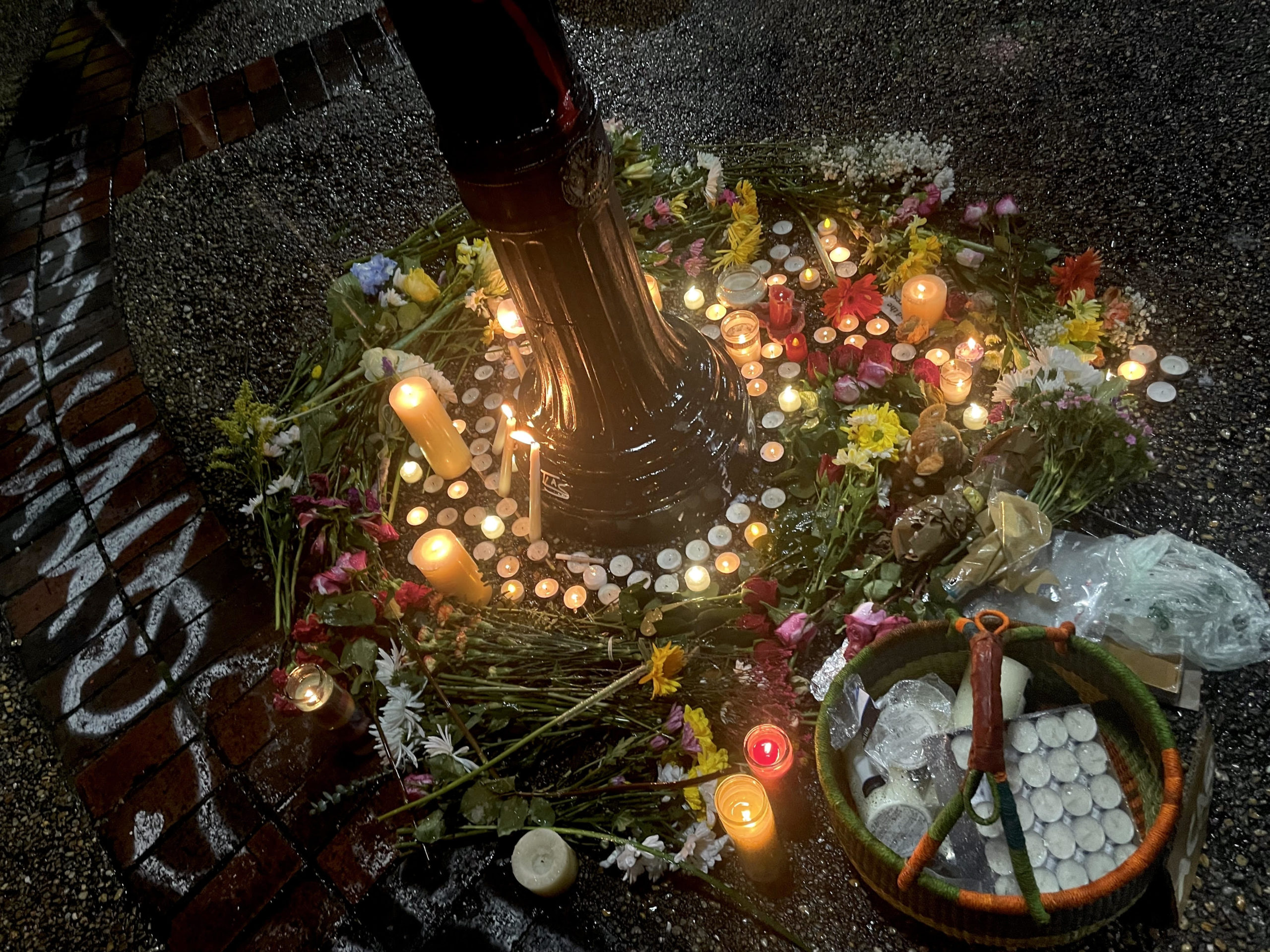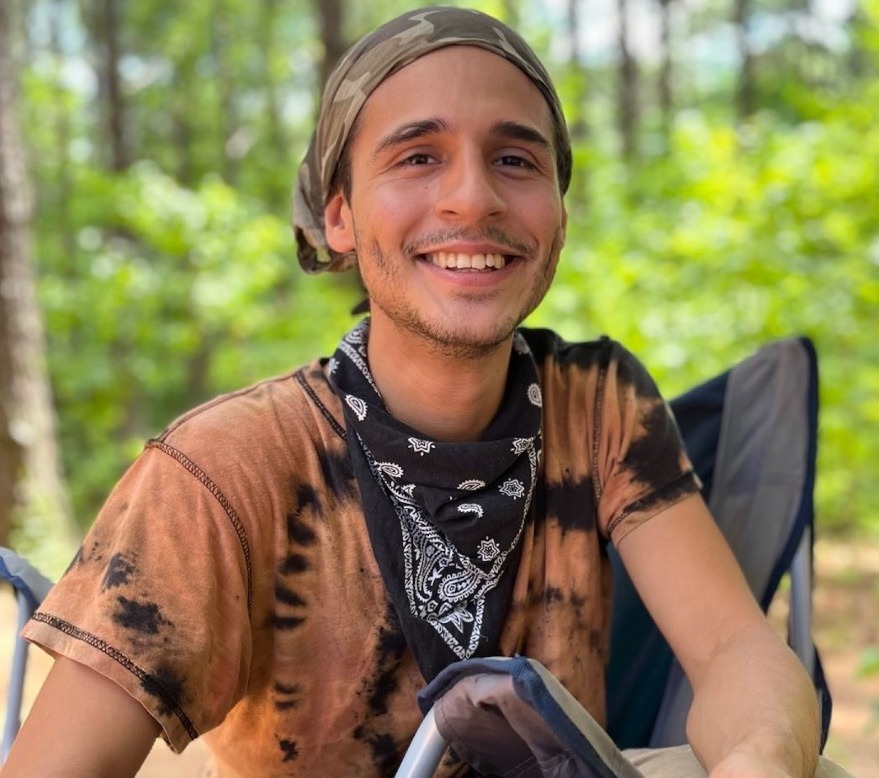Police Killing of Protester Brings Grief, Urgency to Atlanta’s ‘Stop Cop City’ Movement
Organizers are calling on national support for their continued efforts to halt the construction of a police militarization facility in the Atlanta forest.

This story was produced in partnership with The Mainline, an independent magazine based in Atlanta.
In an interview from an encampment in the Atlanta forest last year, a protester identified only as Tortuguita—Spanish for “little turtle”—explained how nonviolence would pave the way for them to successfully stop “Cop City,” a proposed $90 million police training facility slated to be built across 85-acres of dense woodland.
“We get a lot of support from people who live here, and that’s important because we win through nonviolence,” Tortuguita, who used they/them pronouns, told journalist David Peisner for a feature published in Bitter Southerner in December and updated this week. “We’re not going to beat them at violence.”
On Wednesday morning, Atlanta police shot and killed Tortuguita during a SWAT operation to clear a protest camp, where self-described “forest defenders” have been gathered for more than a year. Law enforcement officials claim that Tortuguita—a 26-year-old whose birth name was Manuel Teran—refused to exit their tent and shot first, leading officers to return fire. Police reported that one officer was struck by gunfire, and was recovering at a local hospital. But organizers of the “Stop Cop City” movement have expressed skepticism about the official narrative. Teran wasn’t known to own a gun or carry one in the forest, they told The Appeal. They have demanded an independent investigation and called for the release of body camera footage of the incident.
Teran’s killing follows months of escalations by police against Stop Cop City protesters, which have sparked a series of tense, sometimes fiery confrontations in the forest. Last June, police showed up to a Stop Cop City demonstration with guns drawn and proceeded to arrest both protesters and uninvolved bystanders. Organizers reported that police activity in the forest had become more frequent and heavy-handed in recent months, often leading to violent detainments. Protesters say police have used tear gas and rubber bullets on forest defenders, including so-called “tree sitters” camped on platforms suspended far off the ground. In December, authorities arrested five protesters at the camp and charged them with “domestic terrorism”—charges that can carry a prison sentence of up to 35 years. Seven more protesters were hit with domestic terrorism charges this week in a wave of arrests following the shooting. Organizers say activists and their families have also faced growing harassment by law enforcement outside the protest camp, including at their homes.
In a statement sent to journalists this week, Stop Cop City ATL portrayed Teran’s death as a tragic culmination of increasingly aggressive law enforcement tactics.
“Police are the ones entering the forest with firearms and threatening to shoot,” the statement reads. “They’ve been doing this routinely for months. It’s sadly no surprise that eventually they would hurt someone.”
As activists in Atlanta grieve the loss of a fallen comrade and begin the fight for transparency and justice, some have begun to look forward. While organizers have expressed fears about the threat of mounting violence at the hands of police, many also see Teran’s death as a potential turning point for the burgeoning movement.
“This killing creates a huge danger for people to go into the forest and camp out at this stage,” said Kamau Franklin, founder of Community Movement Builders—a Black-led nonprofit that has helped organize against the Cop City project—in an interview with The Appeal. “I think this means we have to continue to gather people from around the country to do things where they’re at to protest Cop City. I think we have to continue being in the streets. This is a further call to action that militarized police are a danger to the community.”
On Wednesday evening, around 200 people gathered at the square of Atlanta’s Little Five Points neighborhood for a vigil honoring Teran’s life. Some surrounded a banner that read, “Trees give life, police take it.” Many held candles as others huddled around an open microphone, exchanging words, prose, and song to commemorate Teran’s life. Activists in cities across the country hosted similar events in mourning and solidarity with the Stop Cop City movement.
At the Atlanta vigil, local organizers pointed out that Teran’s death was the latest in a long history of police killings and violence against community members.
“We know this tactic of murdering protesters is what happens when the government is afraid,” said Monica Johnson of the Atlanta branch of the Party for Socialism and Liberation, a far-left political organization active in anti-police brutality movements. “We know all of us are united in wanting to see this land returned to the people and used for the betterment of those who were killed and enslaved for it, and not for their further genocide.”
Marlon Kautz, an organizer with the Atlanta Solidarity Fund, which provides financial resources and legal services for arrested protesters, said the organization would be preparing a legal team to investigate Teran’s killing and pursue a wrongful death suit.
“I’ve seen a lot, but never did I think I would be responding to an incident where police have killed a protester in order to prevent the continuation of a political movement,” Kautz said. “This is not something I thought I would see in Atlanta, in my lifetime. And yet, here we are.”
In the days after the shooting, tributes to Teran have flowed in from friends and fellow organizers, recognizing their work in the community. They lauded Teran as a mutual aid organizer who helped build houses for low-income communities in Florida, and a respected figure in Atlanta’s queer and BIPOC communities.
Tortuguita was “a trained medic, a loving partner, a dear friend, a brave soul, and so much more,” read one remembrance posted to Instagram. “In Tort’s name, we continue to fight to protect the forest and stop Cop City with love, rage, and a commitment to each other’s safety and well-being.”

In September 2021, the Atlanta City Council passed an ordinance forming the lease agreement to build Cop City on a sprawling property in the South River Forest, also known as Weelaunee Forest. Before the vote, city council members were required to listen to 17 hours of public comment from local residents. An overwhelming majority testified against the facility. The lease agreement ordinance contains a clause stating that the city may terminate the lease “with or without cause,” as long as it provides at least 180 days written notice to the Atlanta Police Foundation, the lease-holder. The mayor holds unilateral power to end the agreement.
Over the past year and a half, local organizations have formed a large and diverse coalition of civil rights groups and neighborhood and business associations, all intent on building political pressure to terminate the lease. In addition to regular protests, members of these organizations have gathered at DeKalb County Courthouse and hosted community town halls and other actions in support of ending construction and preserving the forest.
In the wake of Teran’s killing, the Stop Cop City movement appears to be attracting attention on a global scale. Climate activists in Lützerath, Germany, issued a video statement this week in solidarity with Stop Cop City. Activists in Greece have also expressed support. With a series of demonstrations planned in Atlanta in the coming days and support continuing to flood in from across the nation, organizers are hopeful that Teran’s death will raise further awareness about the land-protection battle still raging in the city—now one of the largest since the oil pipeline protests at the Standing Rock Indian Reservation.
“Police committed violence today on land that was stolen from Muskogee Creek people, on land where incarcerated Black people were forced to labor, on land they now want to tear down—crucial forest land in a climate disaster—to be a massive police militarization facility, just a couple years after the 2020 uprisings,” local organizer Micah Herskind said, during a speech at Wednesday’s vigil. “They can stop [Cop City] tomorrow, if they want to. Cop City does not need to be built. The people of Atlanta don’t want Cop City.”
